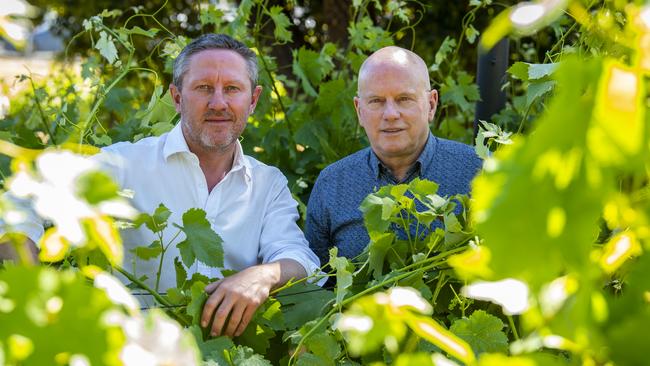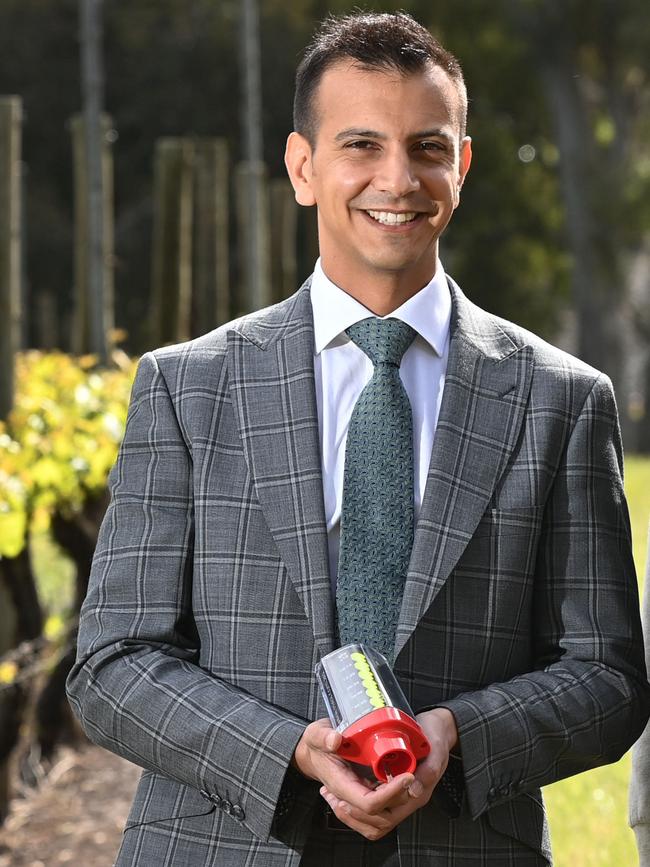Wine benefits from hi-tech skills
‘Wine tech’ is very much a thing in South Australia, but where the emphasis goes on those words is important.

It would hardly surprise anyone that in South Australia, home to some of the greatest wine regions in the world, “wine tech” is very much a thing — but where the emphasis goes on those words is important.
“It’s just tech applied to wine,” says Seth Thuraisingham, chief executive of Consilium Technology, a machine learning, modelling and digital-twin simulation specialist firm.
In 2019, Consilium’s agtech product — GAIA — identified and mapped all of Australia’s vineyards, using AI and satellite imagery. Using machine learning algorithms, GAIA (now a separate business) automatically scanned high-resolution satellite images of Australia’s wine regions to identify exactly where the vineyards are located, and how many vine rows are planted. The data was used in Australia’s National Census of Vineyards.
The scan was the first of its kind in the world, and replaced the old Australian Bureau of Statistics (ABS) paper-based sector survey, last reported in 2015.
With high accuracy, GAIA revealed there are 146,128ha under vine across Australia’s 65 wine regions. For the first time, Australia’s grape and wine sector knows the locations of these plantings — information crucial for emergency biosecurity responses, as well as regulating wine labelling requirements based on where the grapes are grown.

Consilium also works for defence and other industry sectors such as mining, developing simulations of real-world environments, and although mapping vineyards might not sound connected to that work, Thuraisingham says it was “stimulated” by the defence industry.
“We’ve simply transferred technology, know-how and IP from the defence sector to other industries, and that was a deliberate strategy,” he says.
“As a company we wanted to diversify our markets — that’s how we worked our way into wine tech, and more broadly, the ag-tech sector. It was a deliberate strategy.
“The competitive advantages of being in SA are defence, the wine industry, mining and energy, and healthcare. In effect, the state is a rich tech ecosystem, and all these things are linked.
“To us, it makes sense, because just like defence, viticulture is scalable globally — if you have a good product, it’s not just going to work in Australia.”
With roughly half of Australia’s wine industry in SA, entrepreneurs “can’t help but put a big focus on it”, says grape grower and farmer David Travers, partner in agricultural integrity supply chain platform, Entrust.
“Technology is always more effective where it’s solving a problem that exists, rather than some entrepreneur coming up with an idea and then going looking for a problem to solve,” Travers says.
‘Just like defence, viticulture is scalable globally — if you have a good product, it’s not just going to work in Australia’
The problem that Travers and his partner, winemaker Jeffrey Grosset, were keen to solve was wine fraud, a worldwide issue that strips an estimated $70bn a year from the global wine industry. In March 2019, the pair won $50,000 at the SA Premier’s Blockchain Innovation Challenge, and set about applying the immutable database principles of distributed ledger technology (DLT) to the wine supply chain.
“We’re using Hashgraph, which is generation four of DLT — the blockchain was generation one — and combining that with IoT (Internet of Things), cloud and mobile, to provide a trusted, verifiable system where records are geolocated, time stamped and immutable,” Travers says. “Entrust ensures end-to-end supplier, manufacturer and consumer security, and automates record keeping of every stage of the wine production process, from grower to glass. Wherever you are in the world, Entrust allows easy verification of product provenance, authenticity and seal integrity, on the spot, prior to purchase.”
Travers says the platform helps to address the issue of brand trust for Australian exports — a huge issue in markets such as Asia — and its use is not limited to wine.
“This isn’t just ‘wine tech’, it’s ‘horti tech’ and it’s ‘bulk-farming tech’,” he says, “which allows producers to capture and digitally log the movement of primary products, and to track and trace secondary manufactured products such as wine, milk or beef into supply chains. It’s the digital route to market.”
Entrust is not the only company working on the wine fraud issue in Adelaide. Local start-up eBottli delivers new tracking and blockchain data technologies, geolocating services for bottles or containers, and unique identifier labels for winemakers.
ZionTech has developed a user-friendly blockchain-based platform allowing wineries to track the provenance of a bottle of wine, and has launched its Titanium Thread app, which creates a “digital cellar door” allowing consumers to use their smartphones to scan wine labels and discover the vineyard’s story.
Cellr is incorporating Near Field Communication (NFC) and Radio Frequency Identification (RFID) chips into wine bottle caps, which can be scanned by an accompanying app, which instantly confirms the wine’s provenance, producer and, as an option, brand or promotional messaging.
Yet another example of wine tech is the VitiVisor digital platform, designed to support on-farm decision-making for wine grape production. VitiVisor collects information from the vineyard through cameras and sensors, and analyses the data produced to assess vineyard performance — using AI, machine learning and robotics — and offer advice on management practices such as irrigation, pruning, fertiliser, fungicide and pesticide applications. Led by the University of Adelaide, the project is a colla-boration between the university, Riverland Wine and Wine Australia, with support from UniSA and the Department of Primary Industries and Regions. The end product will be open-source, open to and usable by all growers.
‘With SA one of the great wine capitals of the world, we wanted to accelerate the next wave of tech in wine and tourism, and support its development on home soil’
At the consumer end, digital ways to augment the wine experience are emerging. Twenty Five Doors partners with cellar doors for better wine tourism experiences using a digital map and marketplace to help them connect with consumers. Wine journal app Dionysus helps wine festival-goers find and buy the bottles they tried and loved, after the festival.
The varied buzz of activity in wine tech is music to the ears of Darren Oemcke, director of Hydra Consulting, an Adelaide advisory company serving the wine, food, agriculture and tourism industries. Along with the New Venture institute, the venture arm of Flinders University, and the Wine Industry Suppliers of Australia (WISA), Oemcke’s business formed FOMENT, conceived as Australia’s wine tech and tourism tech accelerator.
“With SA one of the great wine capitals of the world, we wanted to accelerate the next wave of tech in wine and tourism, and support its development on home soil, and put Australia on the map, as the global home of wine tech and tourism tech,” Oemcke says. “The accelerator builds on a long tradition of R&D in the state’s wine sector, and we wanted to make sure that the industry had great access to new ideas.”
The University of Adelaide’s School of Agriculture, Food & Wine is already a hub of wine research and expertise, and Oemcke is also excited by Flinders’ new Bachelor of International Business degree in wine, spirits and tourism.
“That’s pretty exciting for FOMENT,” he says, “because that new degree is focused on the next generation of technologies already revolutionising the wine and tourism industries, and we’re leveraging FOMENT to connect these technologies and the participants we have in the program, with the students and professionals who are coming to this new degree.”
